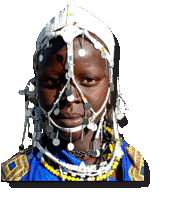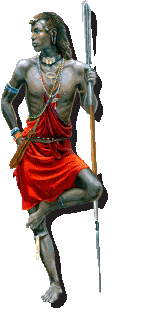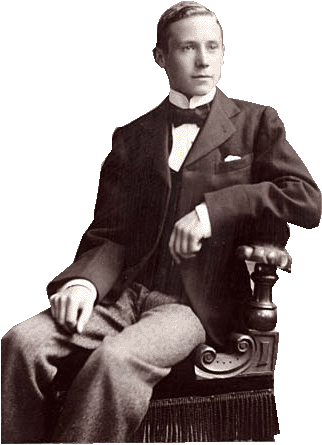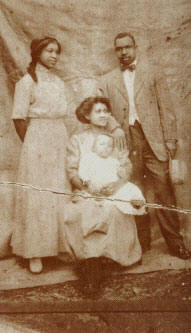How
it Feels to Be Colored Me
by Zora Neale Hurston
1928

But I am not tragically colored. There is no great sorrow damned up in
my soul, nor lurking behind my eyes. I do not mind at all. I do not belong
to the sobbing school of Negrohood who hold that nature somehow has given
them a low-down dirty deal and whose feelings are all hurt about it. Even
in the helter-skelter skirmish that is my life, I have seen that the world
is to the strong regardless of a little pigmentation more or less. No, I
do not weep at the world--I am too busy sharpening my oyster knife.
Someone is always at my elbow reminding me that I am the granddaughter
of slaves. It fails to register depression with me. Slavery is sixty years
in the past. The operation what successful and the patient is doing well,
thank you. The terrible struggle that made me an American out of a
potential slave said “On the line!” The Reconstruction said “Get set!”;
and the generation before said “Go!” I am off to a flying start and I must
not halt in the stretch to look behind and weep. Slavery is the price I
paid for civilization, and the choice was not with me. It is a bully
adventure and worth all that I have paid through my ancestors for it. No
one on earth ever had a greater chance for glory. The world to be won and
nothing to be lost. It is thrilling to think--to know that for any act of
mine, I shall get twice as much praise or twice as much blame. It is quite
exciting to hold the center of the national stage, with the spectators not
knowing whether to laugh or to weep.
The position of my white
neighbor is much more difficult. No brown specter pulls up a chair beside
me when I sit down to eat. No dark ghost thrusts its leg against mine in
bed. The game of keeping what one has is never so exciting as the game of
getting.
I do not always feel colored. Even now I often achieve the
unconscious Zora of Eatonville before the Hegira. I feel most colored when
I am thrown against a sharp white background.
For instance at
Barnard. “Beside the waters of the Hudson” I feel my race. Among the
thousand white persons, I am a dark rock surged upon, and overswept, but
through it all, I remain myself. When covered by the water, I am; and the
ebb but reveals me again.
Sometimes it is the other way around. A
white person is set down in our midst, but the contrast is just as sharp
for me. For instance, when I sit in the drafty basement that is The New
World Cabaret with a white person, my color comes. We enter chatting about
any little nothing that we have in common and are seated by the jazz
waiters. In the abrupt way that jazz orchestras have, this one plunges
into a number. It loses no time in circumlocution, but gets right down to
business. It constricts the thorax and splits the heart with its tempo and
narcotic harmonies. This orchestra grows rambunctious, rears on its hind
legs and attacks the tonal veil with primitive fury, rending it, clawing
it until it breaks through to the jungle beyond. I follow those
heathen--follow them exultantly. I dance wildly inside myself; I yell
within, I whoop; I shake my assegai (a light spear used by tribesmen in
southern Africa) above my head, I hurl it true to the mark yeeeeooww! I am
in the jungle and living in the jungle way. My face is painted red and
yellow and my body is painted blue. My pulse is throbbing like a war drum.
I want to slaughter something--give pain, give death to what, I do not
know. But the piece ends. The men of the orchestra wipe their lips and
rest their fingers. I creep back slowly to the veneer we call
civilization with the last tone and find the white friend sitting
motionless in his seat, smoking calmly.

 |
“Good music they have here,” he remarks, drumming the table with
his fingertips.
Music. The great blobs of purple and red emotion have not touched
him. He has only
heard what I felt. He is far way and I see him but dimly
across the ocean and the continent that have fallen between us.
He is so pale with his whiteness then and I am so colored.
At
certain times I have no race, I am me. When I set my hat at a
certain angle and saunter down Seventh Avenue, Harlem City, feeling as
snooty as the lions in front of the Forty-Second Street Library, for
instance. So far as my feelings are concerned,
Peggy Hopkins Joyce5 on the
Boule Mich6 with her gorgeous
raiment, stately carriage, knees knocking together in a most aristocratic
manner, has nothing on me. The cosmic Zora emerges. I belong to no race
nor time. I am the eternal feminine with its string of beads.
I have no separate
feeling about being an American citizen and colored. I am merely a
fragment of the Great Soul that surges within the boundaries. My country,
right or wrong.
Sometimes, I feel
discriminated against, but it does not make me angry. It merely astonishes
me. How can any deny themselves the pleasure of my company? It’s beyond
me.
But in the main, I feel
like a brown bag of miscellany propped against a wall. Against a wall in
company with other bags, white, red and yellow. Pour out the contents, and
there is discovered a jumble of small things priceless and worthless. A
first-water diamond, an empty spool, bits of broken glass, lengths of
string, a key to a door long since crumbled away, a rusty knife-blade, old
shoes saved for a road that never was and never will be, a nail bent under
the weight of things too heavy for any nail, a dried flower or two still a
little fragrant. In your hand is the brown bag. On the ground before you
is the jumble it held—so much like the jumble in the bags, could they be
emptied, that all might be dumped in a single heap and the bags refilled
without altering the content of any greatly. A bit of colored glass more
or less would not matter. Perhaps that is how the Great Stuffer of Bags
filled them in the first place—who knows?
1928

